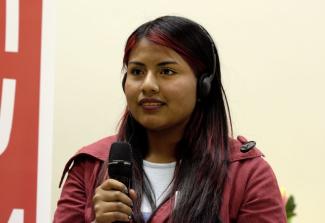Child soldiers
Back to a normal life

If you sit opposite Claudia (name changed) you can see that she is a likeable young women, who has a good sense of humour, noticeable dimples and red strands in her long black hair. The student dreams of travelling to as many countries as possible and “making full use of her life”. Claudia is a former child soldier who has made it back to a normal life.
The 20-year-old woman comes from a rural area of Colombia. Her father was a single parent and raised her and four other siblings. Money was tight. When the enthusiastic student went to 11th grade, the family’s economic hardship became overwhelming. When Claudia was 16 she saw no other way out than to join the armed militia group that was a regular presence in her village. Claudia shared her story with us in late January at an event Don Bosco hosted in Bonn.
Poverty is the main reason why minors (young people) join the rebels. In addition to the best-known rebel group FARC-EP (Fuerzas Armadas Revolucionarias de Colombia – Ejército del Pueblo), the UN has repeatedly accused other groups such as ELN (Ejército de Liberación Nacional) of recruiting children.
The 2016 peace agreement between the FARC and the Colombian government ended 50 years of civil war. This tentative agreement made it easier to work with the victims of the civil war, Father Rafael Bejarano says. He directs Ciudad Don Bosco in Medellín, the child-protection centre where Claudia lives. Domestic companies, for example, have been hiring victims of armed conflict. Yet, in spite of the agreement with the FARC, Colombia is still far from peace, Bejarano regrets. The rebels’ political and criminal motives were intertwined, especially as militant groups’ funding depended on the drug trade. In late January, the Colombian government suspended the peace talks with the ELN rebels – for the time being.
Claudia tells the story of her everyday life during the 15 months she spent with the fighters. She learned how to handle weapons and participated in armed clashes with government forces. She recalls being very scared. “You can’t forget times like that, but you can come to grips with the memories,” she says.
While on an errand in the city, she was arrested by government soldiers one day. That was her salvation. At first she came to live with a family, later she would move to Ciudad Don Bosco in Medellín. The long road of reintegration had begun. Claudia’s advantage, according to her supervisor Olga Cecilia García Flórez, was that she had been attending school for a long time before joining the militia. Many of the children arrive at the Don Bosco not only in poor physical and mental health, but they are also illiterate. Most missed several years of formal education.
Claudia remembers, however, that her early years in the centre were very depressing. A ray of hope was her brother, whom she reunited with at the Ciudad Don Bosco. He had joined an armed militia group before her and was also captured by the military.
Around 250 former child soldiers are presently cared for in the Ciudad Don Bosco. In addition to the house in Medellín, Don Bosco has another centre in Cali. The traumatised children and adolescents receive a foster family in the community, the caregivers try to give them a sense of belonging and prepare them for a future in society, Father Rafael reports. When the young people leave the child-protection centre, they have been taught vocational skills, from hairdressing to car mechanics. Father Rafael says that the children come to the child-protection centre voluntarily, and this contributes to the centre’s success.
Over the past years, Don Bosco has looked after over 2,300 former child soldiers in Colombia. The two institutions in Medellín and Cali not only train young people, but also help them to cope with the traumas. Claudia stayed at Ciudad Don Bosco for three years and has recently left the programme. She is presently fulfilling her dream of studying health management – with the help of a Don Bosco scholarship.












